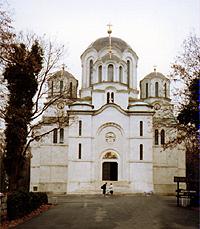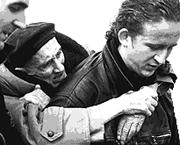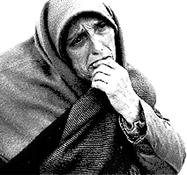History of Kosovo to 1918
In medieval times, Kosovo was part of the original Serbian kingdom. Together with some neighboring areas, Kosovo entered the annals of history as Stara Srbija, or Old Serbia. The Serbian rulers from the 12th century onward built churches, monasteries, and fortresses in the area, such as those at Gracanica, Decani, Pec, and Prizren. These kings also competed for territory with the neighboring Byzantine and Bulgarian Empires. Ecclesiastical (church) structure was very important in all medieval European kingdoms. In Eastern Europe, where the type of Christianity known as Eastern Orthodoxy was predominant (in contrast to Roman Catholicism and later Protestantism in Western Europe), churches are organized along national lines. That is why, for example, there are Russian, Greek, Bulgarian, and other Orthodox churches. The Serbs founded their own independent Christian church in 1219. At its head was a man known as the patriarch. Today, the first patriarch is known and revered as Saint Sava. The headquarters of the church soon came to be located in Pec, one of the major cit ies of today's Kosovo. Photo: A Southern Orthodox church in central Serbia. Photo by John K. Cox.
Ecclesiastical (church) structure was very important in all medieval European kingdoms. In Eastern Europe, where the type of Christianity known as Eastern Orthodoxy was predominant (in contrast to Roman Catholicism and later Protestantism in Western Europe), churches are organized along national lines. That is why, for example, there are Russian, Greek, Bulgarian, and other Orthodox churches. The Serbs founded their own independent Christian church in 1219. At its head was a man known as the patriarch. Today, the first patriarch is known and revered as Saint Sava. The headquarters of the church soon came to be located in Pec, one of the major cit ies of today's Kosovo. Photo: A Southern Orthodox church in central Serbia. Photo by John K. Cox. Kosovo is called the cradle of Serbian civilization because an important battle took place there in 1389. The Nemanja dynasty had died out shortly after its peak during the impressive reign of Emperor Dusan (r. 1331-1355). When the Ottoman Turks continued their push north and west from their foothold in Europe, they still faced determined resistance, however, from Serb forces and their allies, led by a prince named Lazar Hrebeljanovic.
The battle on June 28, 1389, at a site known as the Field of Blackbirds just outside today's Pristina, brought disaster to the Serbs. Although a semi-independent Serbian state would survive for another seventy years, this battle was the beginning of a long period of occupation and foreign domination for the Serbs.
The date of the battle has, paradoxically, become the single most important red-letter day in Serbian history. The Serbs grew increasingly proud of their tradition of resistance to the Turkish invaders, who were Muslim. As memorialized and mythologized--to this day--in Serbian epic poetry, folk songs, and nationalist histories, the Serbs saw themselves as the bulwark of Christendom that had blunted the force of the Ottoman invasion. The Ottomans went on to capture Bosnia, Hungary, and much of Croatia, and they besieged the great central European city of Vienna twice. But the significance of the Serbian pride in resistance to the Ottomans is more than just military and nationalist; it also reflects the "crusading" mentality so common in Europe in the Middle Ages. Christian Europeans often cooperated in land and sea campaigns against the Turks, whom they regarded as infidels. The Europeans had also mounted bloody invasions of the Holy Land a few centuries earlier during the Crusades, ostensibly fighting a holy war to liberate the area from the rule of Muslims.
It is important to note that in 1389 the Serbs were assisted by the Albanians in the Battle of Kosovo. The Albanians were also Christians. After suffering defeat by the Ottoman army, many Albanians gradually converted to Islam, as did other Europeans in Bosnia and Bulgaria.
This famous battle symbolizes the survival of the Serbian culture and language during the centuries of Ottoman rule. This survival was due in part to the Ottoman style of rule, which was usually rather indirect and did not aim at the assimilation of its conquered peoples. But it was also due to the structure and intellectual feats of the Serbian Orthodox Church. The church played an important administrative role under the Ottomans and kept alive a sense of Serbian identity, unity, and territorial claims. Thus, the Battle of Kosovo stands in Serbian history and culture as a symbol of suffering, of the struggle against invaders, and of cultural survival against the odds.
There is little hard data about the population of Kosovo during these medieval centuries. In all likelihood, it was probably--like many places in the Balkans--mixed. By the end of the 17th century, however, Albanians formed a majority in this "Old Serbian" province. In 1690, amid the fear and chaos of a Habsburg-Ottoman war, many Serbs fled north to safer territory in the Habsburg Empire in a mass exodus of some 37,000 families.
Kosovo then remained an Ottoman province until it was seized by Serbia in the Balkan Wars of 1912-1913. By this time, the Ottoman Empire had acquired a reputation as "the sick man of Europe." The process of political decay resulted in great losses of territory to its rebellious subjects and to outside powers. Historians call this process the Eastern Question.
As the Ottoman Empire declined after about 1700, it experienced various national rebellions in its European and North African territories, as its subject peoples began to demand autonomy or independence. By 1912, most European Ottoman possessions had been transformed into the independent countries of Bulgaria, Romania, Greece, and Serbia. These subject peoples had undergone national renaissances in their cultures and had managed to carve out national states for themselves. The Albanians, however, along with the Macedonians, were among the last Ottoman peoples to develop a sense of national identity. With a great deal of involvement by the great powers of Europe, the country of Albania was formed in 1913. The Serbs resisted the creation of this country, not only because they thought it would stir up trouble in the ethnically mixed province of Kosovo but also because it blocked Serbian access to the Adriatic Sea.
http://www.cotf.edu/earthinfo/balkans/kosovo/KVtopic3.html
 NATO has intervened on behalf of the Kosovars and is bombing Serbia in an attempt to force President Milosevic to stop attacking his own population. A huge international relief effort is underway to help the refugees, but still, one can say that a nightmare in humanitarian and military affairs is emerging in and around Kosovo at this time. NATO is intervening to stop genocide in Kosovo and to prevent the conflict from spreading. So far, President Milosevic has firmly maintained his grip on power in rump Yugoslavia, and refugees are continuing to flood out of Kosovo. NATO air strikes have been unable to halt the campaign of forced expulsion and genocide by Serbian military and militia forces. Photo courtesy of UNHCR Media and Public Affairs Unit (R. LeMoyne)
NATO has intervened on behalf of the Kosovars and is bombing Serbia in an attempt to force President Milosevic to stop attacking his own population. A huge international relief effort is underway to help the refugees, but still, one can say that a nightmare in humanitarian and military affairs is emerging in and around Kosovo at this time. NATO is intervening to stop genocide in Kosovo and to prevent the conflict from spreading. So far, President Milosevic has firmly maintained his grip on power in rump Yugoslavia, and refugees are continuing to flood out of Kosovo. NATO air strikes have been unable to halt the campaign of forced expulsion and genocide by Serbian military and militia forces. Photo courtesy of UNHCR Media and Public Affairs Unit (R. LeMoyne)Since Kosovar resistance to Serbian rule has now been broken, with the Kosovo Liberation Army (KLA) in headlong retreat with the civilian refugees, much of the region's fate depends on the NATO and eventually UN response to the actions of the Serbian government.
It is unlikely that the Serbs will be allowed to maintain their control over a Kosovo forcibly emptied of hundreds of thousands of Albanians. The strain on neighboring countries, as well as the fear of establishing a bad precedent, will encourage NATO to continue acting decisively. Two other scenarios are more likely. The international community will return the Kosovars to their land and the region will then receive either autonomy (limited home rule) from the Serbian government, or the region will be separated from Serbia. In the latter case, the likelihood is strong that Kosovo would no longer remain an independent state. It would probably carry out enosis, the process of secession and reattachment to the ethnic homeland, and join the neighboring country of Albania, a senario which would no doubt enrage Serbians and leave a major plank of their national program unfulfilled.
The current NATO intervention in Kosovo will be of great interest to diplomats and scholars in the future. It represents the Alliance's first intervention in the internal affairs of a nonmember country. What is more, the Allied bombing campaign on behalf of the Kosovars was carried out without UN approval. These facts make it very different for the combined UN-NATO efforts in Bosnia. Does this represent a de facto redefinition of sovereignty, at least in Europe? Is the power of the UN being eclipsed? Might this interventionist precedent be used to put pressure on other countries, such as Russia and China, which have separatist-minded regions?
 Or was NATO simply acting to stop genocide in a place that was accessible to NATO power? Does this mean the world has truly learned a lesson from the World War II Holocaust? Or was the U.S.-led intervention occasioned primarily by the desire to stop this local conflict from becoming a regional one that could involve the NATO allies Greece and Turkey?
Or was NATO simply acting to stop genocide in a place that was accessible to NATO power? Does this mean the world has truly learned a lesson from the World War II Holocaust? Or was the U.S.-led intervention occasioned primarily by the desire to stop this local conflict from becoming a regional one that could involve the NATO allies Greece and Turkey? http://www.cotf.edu/earthinfo/balkans/kosovo/KVtopic6.html
沒有留言:
張貼留言